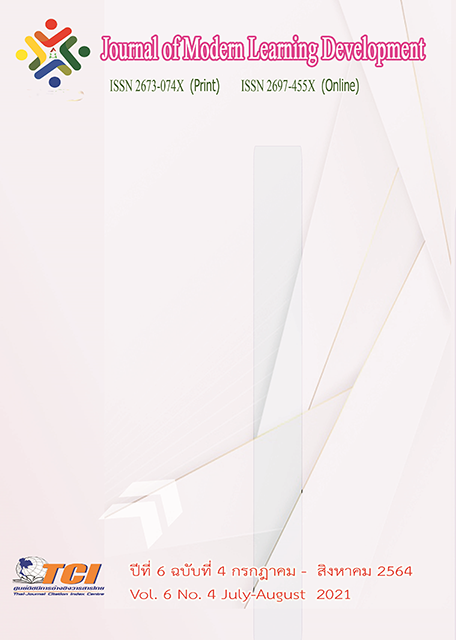Personnel Administration Approach base on 7th Aparihaniyadharmma Principle of Administrators at Pariyattidhamma schools, Nong Khai Province
Main Article Content
Abstract
The purposes of this research were; 1) to study the principle of the Seven Aparihãniyadhamma 2) to study the problem situation of the personnel administration of the administrator in Pariyattidhamma School under the Office of the General Education in Nong Khai Province and 3) to propose the guideline for the personnel administration in accordance with the Seven Aparihãniyadhamma of the administrators of Pariyattidham school under the Office of the General Education of Nong Khai Province. This research was the qualitative research. The instruments for research were the depth-interview formats consisting of administrators and teachers for 25 subjects and to propose the results of research by using the descriptive analysis with inductive method.
The results of research were found that the principle of the Seven Aparihãniyadhamma as appeared in Theravada Buddhism explained the principle of Aparihãniyadhamma in Suta. In this research, it will say about the principle of the Seven Aparihãniyadhamma that is the foundation of the Conditions of Welfare by applying it for the personnel administration of the Pariyattidhamma school in the General Education Section of Nongkhai Province consisting of the 7 items, that is, 1) to hold regular and frequent meetings 2) to meet together in harmony and disperse in harmony and do the business and duties of the Order in harmony 3)to introuduce no revolutionary ordinance, break up no established ordinance but train oneself in accordance with the prescribed training rules 4) to honor and respect the leaders in the level of the elders 5) to honor and protect women and let the women participate and administrate the organization as equal with men 5) to honor and worship the monuments and the objects of worship and not to condemn the places because in every place, there still have the important things and the objects of worship and 7) to take care and pay attention to the visitors and to welcome with warmly heart and to listen to the advice from those people who come to visit.
The problem condition of the personnel administration of the administrators of Pariyattidhamma school under the Office of the General Education of Nong Khai Proince consists of 6 aspects, that is, 1) the aspect of manpower planning, the recompensing force is used in the case of the resignation of personnel or in the case of sickness at once 2) to select personnel in the narrow circle because their education to select personnel is less 3) In the aspect of maintenance and protection, personnel who have experience and worked for a long time resign from their work and to be lack of personnel who have ability 4) in the aspect of developing personnel, some organizations have the problems because they do not organize the academic seminar in order to create the qualification of personnel 5) in the aspect of evaluation of work, some administrators use their own knowledge in evaluation. It may cause the un-satisfaction for personnel. 6) In the aspect of regulation and observance of regulation, individuals should observe the rule seriously. If they violate the rules they will be punished in accordance with the offense.
The way how to administer the personnel in accordance with the principle of Seve Aparihãniyadhamma of the administrators of Pariyattidhamma school under the Office of the General Education of Nongkhai Province consists of 8 aspects, that is, to determine the time tables for the meeting in each fiscal year 2) the regulation or the rule for practice in entering the meeting is the harmony meeting 3) to provide the rule, order and various regulations in the school should be attached to the right way with Dhamma 4) to practice the duties in accordance with the chiefs’ order in associating with the law 5) to give the occasion for the women to participate in the administration by using the equal part with men 6) The project or the guideline in enhancement and to preserve the good tradition and culture in the location7) to take care of the visitors who come to visit the school with warm heart 8) to develop the administrative work in compliance with the principle of Seven Aparihãniyadhamma by training, field study and seminar and to evaluate the result of work with honesty by giving the fringe benefit and assistance to the personnel.
Article Details
References
พระมหาอัครา ญาณกวี (เหลื่อมรัมย์). (2551). ศึกษาวิเคราะห์การปกครองตามหลักอปริหานิยธรรมที่มีในพระพุทธศาสนาเถรวาท. วิทยานิพนธ์ศาสนศาสตรมหาบัณฑิต. บัณฑิตวิทยาลัย: มหาวิทยาลัยมหามกุฏราชวิทยาลัย.
พระราชวรมุนี. (2527). สถาบันสงฆ์กับสังคมไทย. กรุงเทพมหานคร: รุ่งแสงการพิมพ์.
พระวิไลสอน อาจารสิริ. (2551). ศึกษาหลักพุทธรรมกับการบริหารงานบุคคลในโรงเรียนวิถีพุทธ สังกัดสำนักงานเขตพื้นที่การศึกษานนทบุรี เขต 2. วิทยานิพนธ์พุทธศาสตรมหาบัณฑิต สาขาวิชาการบริหารการศึกษา. บัณฑิตวิทยาลัย: มหาวิทยาลัยมหาจุฬาลงกรณราชวิทยาลัย.
มหาจุฬาลงกรณราชวิทยาลัย.(2539). พระไตรปิฎกภาษาไทย ฉบับมหาจุฬาลงกรณราชวิทยาลัย. กรุงเทพมหานคร: โรงพิมพ์มหาจุฬาลงกรณราชวิทยาลัย.
ผู้ให้ข้อมูลสำคัญ
พระศรีวชิรโมลี. (สัมภาษณ์ : 16 มี.ค. 2564).
พระครูคุณสารโสภณ. (สัมภาษณ์ : 16 มี.ค. 2564
พระครูสุกิจสุนทร. (สัมภาษณ์ : 16 มี.ค. 2564).
พระครูสุจิตชัยวัฒน์. (สัมภาษณ์ : 16 มี.ค. 2564).
พระครูสุตวาปีพิทักษ์. (สัมภาษณ์ : 16 มี.ค. 2564).
พระครูอนุกูลวรกิจ. (สัมภาษณ์ : 16 มี.ค. 2564).
พระมหาเกริกเกียรติ นิรุตฺติเมธี. (สัมภาษณ์ : 16 มี.ค. 2564).
พระมหานวิน ฐานวโร. (สัมภาษณ์ : 16 มี.ค. 2564).
พระมหาประสพชัย มหาปรกฺกโม. (สัมภาษณ์ : 16 มี.ค. 2564).
คำผัน ทัศพงค์. (สัมภาษณ์ : 16 มี.ค. 2564).
นิดา โกศิลา. (สัมภาษณ์ : 16 มี.ค. 2564).
นิภาพร แก้วมหาดไทย. (สัมภาษณ์ : 16 มี.ค. 2564).
นุสรา คินาพิทย์. (สัมภาษณ์ : 16 มี.ค. 2564).
ปรีชา ดวงศรี. (สัมภาษณ์ : 16 มี.ค. 2564).
ประภาส วงค์ประชุม. (สัมภาษณ์ : 16 มี.ค. 2564).
เพ็ญประภา บุผาแดง. (สัมภาษณ์ : 16 มี.ค. 2564).
พิมพ์พรรณ มาลาอบ. (สัมภาษณ์ : 16 มี.ค. 2564).
พรพรรณ สุขเสน. (สัมภาษณ์ : 16 มี.ค. 2564).
วชิรญา ศรีบุญเรือง. (สัมภาษณ์ : 16 มี.ค. 2564).
ศิริกัลยา องอาจ. (16 มี.ค. 2564).
สัมฤทธิ์ เจนสำโรง. (สัมภาษณ์ : 16 มี.ค. 2564).
เอกรัฐ สุนทรชัย. (สัมภาษณ์ : 16 มี.ค. 2564).
อุทัย โสภาพิมพ์. (สัมภาษณ์ : 16 มี.ค. 2564).


